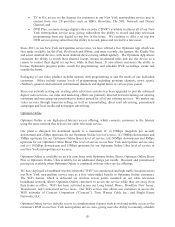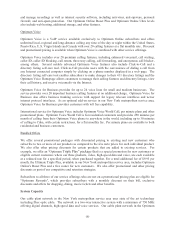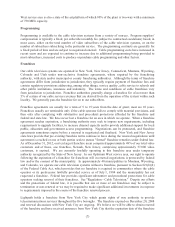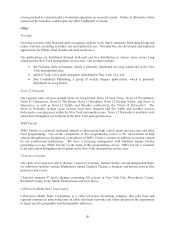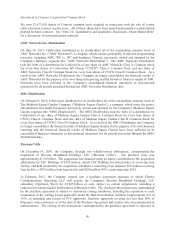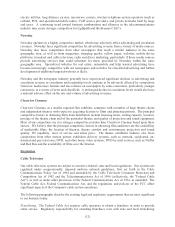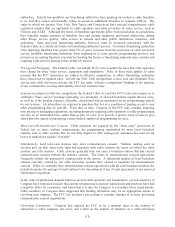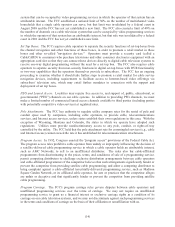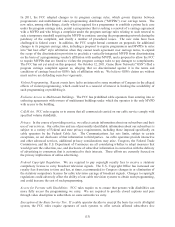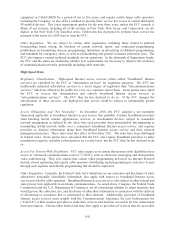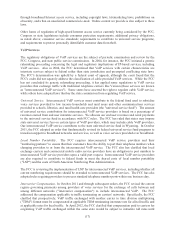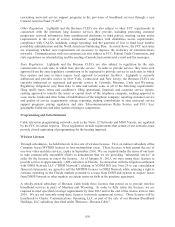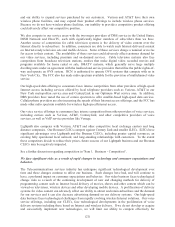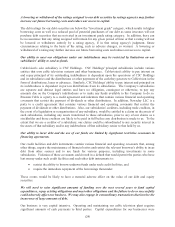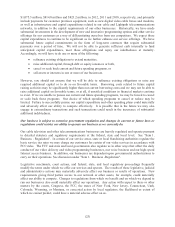Cablevision 2012 Annual Report Download - page 21
Download and view the complete annual report
Please find page 21 of the 2012 Cablevision annual report below. You can navigate through the pages in the report by either clicking on the pages listed below, or by using the keyword search tool below to find specific information within the annual report.(15)
In 2011, the FCC adopted changes to its program carriage rules, which govern disputes between
programmers and multichannel video programming distributors ("MVPDs") over carriage terms. The
new rules, among other things, clarify what is required for a programmer to establish a prima facie case
under the program carriage rules, permit a programmer that is seeking a renewal of a carriage agreement
with a MVPD and who brings a complaint under the program carriage rules relating to such renewal to
seek a temporary standstill requiring the MVPD to continue carrying the programming network during the
pendency of the complaint, and clarify a number of procedural issues. The new rules have been
challenged in federal court. In addition, the FCC sought formal comment on proposals for additional
changes to its program carriage rules, including a proposal to require programmers and MVPDs to enter
into "last best offer" style arbitration when they cannot reach agreement over carriage terms, to expand
the scope of the discrimination provision to preclude a vertically-integrated MVPD from discriminating
on the basis of a programming vendor's affiliation with another MVPD, and a proposal to allow the FCC
to require MVPDs that are found to violate the program carriage rules to pay damages to complainants.
The FCC has not yet acted on this proposal. On October 12, 2011, Game Show Network ("GSN") filed a
program carriage complaint against us, alleging that we discriminated against it in the terms and
conditions of carriage based on GSN's lack of affiliation with us. We believe GSN's claims are without
merit and we are defending ourselves vigorously.
Violent Programming. Recent events have led to an interest by some members of Congress in the alleged
effects of violent programming, which could lead to a renewal of interest in limiting the availability of
such programming or prohibiting it.
Exclusive Access to Multitenant Buildings. The FCC has prohibited cable operators from entering into or
enforcing agreements with owners of multitenant buildings under which the operator is the only MVPD
with access to the building.
CALM Act. FCC rules require us to ensure that all commercials carried on our cable service comply with
specified volume standards.
Privacy. In the course of providing service, we collect certain information about our subscribers and their
use of our services. Our collection and use of personally identifiable information about our subscribers is
subject to a variety of Federal and state privacy requirements, including those imposed specifically on
cable operators by the Federal Cable Act. The Communications Act sets limits, subject to certain
exceptions, on our disclosure of that information to third parties. As cable operators provide interactive
and other advanced services, additional privacy considerations may arise. Congress, the Federal Trade
Commission, and the U.S. Department of Commerce are all considering whether to adopt measures that
would govern the collection, use, and disclosure of subscriber information in connection with the delivery
of advertising to consumers that is customized to their interests. These efforts are currently focused on
the privacy implications of online advertising.
Federal Copyright Regulation. We are required to pay copyright royalty fees to receive a statutory
compulsory license to carry broadcast television signals. The U.S. Copyright Office has increased our
royalty fees from time to time and has, at times, recommended to Congress changes in or elimination of
the statutory compulsory licenses for cable television carriage of broadcast signals. Changes to copyright
regulations could adversely affect the ability of our cable television systems to obtain such programming,
and could increase the cost of such programming.
Access for Persons with Disabilities. FCC rules require us to ensure that persons with disabilities can
more fully access the programming we carry. We are required to provide closed captions and pass
through video description to subscribers on some networks we carry.
Encryption of the Basic Service Tier. If a cable operator decides to encrypt the basic tier on its all-digital
system, the FCC rules require operators of such systems to offer certain affected subscribers free


